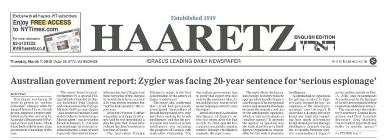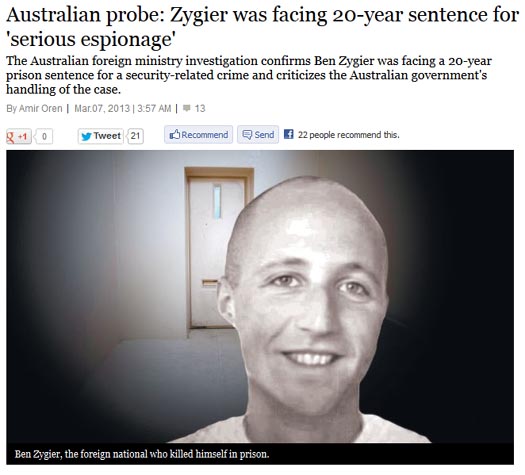What do you get when you mix together a murky spy story, an official Australian report, and Ha’aretz translators and editors whose record on precise reporting is less than stellar, to put it mildly? Answer: Another erroneous front-page headline at Ha’aretz which requires correction. The March 7 top-of-the-page headline (reproduced below) states “Australian government report: Zygier was facing 20-year sentence for ‘serious espionage.'”

Similarly, the online edition appears, as of publication time, as follows:

Thus, reading between the lines, one could reasonably conclude from the report that Mr. Zygier spied for the Mossad, though the report does not actually say so. In addition, the subheadline of Ha’aretz‘s online edition is accurate. It reads: “The Australian foreign ministry investigation confirms Ben Zygier was facing a 20-year prison sentence for a security-related crime and criticizes the Australian’s government’s handling of the case.” Yet, contrary to the main Ha’aretz headlines, nowhere does the Australian government report state Zygier’s sentence was for “serious espionage.” Again, the report does not even contain this phrase, though Ha’aretz sets it off in quotation marks, as if it is a direct quote. As Bob Carr explained in a press conference the same day the report was released:
There’s a convention that I feel committed to that has Foreign Minister not able to comment on matters of intelligence or security. But let me say this; Mr Zygier worked for the Israeli government and open source material, as security services would call it, suggest he worked in the intelligence arm of the Israeli government. You can draw your own conclusions.
Moreover, in an exchange with a reporter during the same press conference, Carr explicitly states that he does not know the cause for Zygier’s detention:
Reporter: Were you able to establish why Mr. Zygier was detained in the first place? I appreciate that [indistinct]
Carr: No we don’t. we don’t know that but again, we’ve asked the Israeli government for all it can tell us about this case. This is covered by a gag order in Israel as you’re aware. It’s not customary for governments to comment on matters of their national security and intelligence. WE look forward to having shared with us the findings of what I understand are the several inquiries taking place in Israel.
Reporter: So just to be clear on that, you don’t know or?
Carr: I don’t know.
The English Ha’aretz article, by Amir Oren, is more accurate than its accompanying headline. Oren begins his report:
Ben Zygier was facing 20 years in prison on “serious espionage” charges when he hanged himself in an Israeli prison, suggests a report published yesterday morning by Australia’s Department of Foreign Affairs and Trade, which found fault with the Australian government’s handling of the case. (Emphasis added.)
Notably, Oren writes that the report only “suggests” “serious espionage.” Yet, in the first paragraph it’s unclear why the term “serious espionage” is in quotation marks, since the report itself never uses this term. In other words, since the words “serious espionage” do not appear in the Australian report, then why use quotation marks? Whose words are they?
The answer awaits only the more ambitious readers. Those who read as far as the third paragraph of the online edition (but inexplicably, not the print edition) learns: “Under Israeli criminal law, the only security-related crimes that carry a 20-year prison sentence fall under the heading of ‘serious espionage.'” Thus, the term “serious espionage” comes from the 1977 Israeli criminal code, and not at all from the Australian Foreign Ministry report. Of course, many news consumers are casual readers who skim just headlines, and maybe the first paragraph, and are therefore not likely to reach the third paragraph clue regarding the origin of the “serious espionage” phrase.
As is often the case, the Hebrew edition, unlike the English edition, was not marred by the factual inaccuracy. (See “Ha’aretz, Lost in Translation” for more on the translation discrepancies.) The Hebrew headlines, but in print and online, are accurate. A screenshot of the latter follows:

It states (CAMERA’s translation):
The Australian report hints: Zeiger was accused of “serious espionage”
Australia reveals that I
srael said that Zygier was expected to serve 20 years. Among the clauses of “serious espionage”: The passing of information to the enemy with the intention of harming the state
While the Hebrew headlines rightly note that the Australian report only hints at “serious espionage,” the plain understanding of the English formulation is that the Australian report actually cited “serious espionage” — in those exact words, no less. This kind of inaccuracy is the trademark of Ha’aretz‘s “tailor-made” English content.
